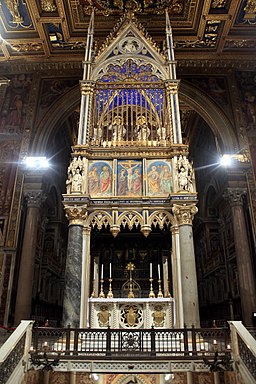
The Third Sunday of Advent is of semi-double rite. The liturgical colour, from Mattins this year, is violet but today at Mass the ministers wear dalmatic and tunicle rather than planetis plicatis and the organ may be played.
Vespers yesterday afternoon were second Vespers of the feast of St. Lucy of Syracuse - a poignant reminder that at the darkest time of the year (in the northern hemisphere) a Light to lighten the Gentiles is coming soon. The, proper, antiphons Orante sancta Lucia etc were sung, doubled, with Pss. 109, 112, 121, 126 & 147. The Office hymn was Jesu corona Virginum. After the collect of the feast a commemoration of the Sunday was sung. At Compline the Dominical preces were omitted.
At Mattins the invitatory is Prope est jam Dominus and the hymn is Verbum supernum. In the first nocturn the antiphons Veniet ecce Rex etc are sung with Pss. 1, 2, 3, 6, 7, 8, 9, 10, 11, 12, 13 & 14. The lessons in the first nocturn are taken from the prophet Isaiah. The first lesson is longer than that found in modern editions and continues until the penultimate sentence of the modern second lesson: justitiam discent habitatores orbis. The second lesson begins Misereamur impio... and continues all through the text of the modern third lesson and beyond: Indulsisti genti Dominie ... murmuris doctrina tua eis. The third lesson is absent from the modern editions and begins Sicut quae concepit... and continues until ... non operiet ultra interfectos suos. (vv. 17 -21). In the second nocturn the antiphons Gaude et laetare etc are sung with Pss. 15, 16 and 17. The lessons are taken from a sermon of St. Leo. These are substantially longer than in the modern editions of the Breviary. The sixth lesson text is completely absent from the modern editions. In the third nocturn the antiphons Gabriel Angelus etc are sung with Pss. 18, 19 and 20. The homily is from St. Gregory's writing on St. John's Gospel. These are the same as those found in the modern editions. A ninth responsory, Docebit nos Dominus, is sung and the Te Deum omitted in the Office of Advent.
At Lauds the antiphons Ecce veniet etc are sung with psalms 92, 99, 62-66, Benedicite and 148-149-150. The hymn is Vox clara ecce intonat. The Suffrages are omitted being Advent.
At Prime the first antiphon from Lauds, Ecce veniet, is sung with the usual Dominical psalms 53, 117, 118(i), 118(ii) and Quicumque. In the short responsory the versicle Qui venturus es in mundum replaces Qui sedes ad dexteram Patris. The Dominical preces are sung. At the other Hours the other antiphons of Lauds are sung in the usual order.
Mass is sung after Terce. The ministers wear violet dalmatic and tunicle rather than folded chasubles. The Gloria in not sung, the second collect is of the Blessed Virgin in Advent, Deus, qui de beate, the third collect Ecclesiae. The Creed is sung, the preface is the Common Preface. As the Gloria was not sung, the dismissal is Benedicamus Domino sung by the deacon facing the altar.
Vespers are of the Sunday. The antiphons Ecce veniet etc are sung with psalms 109, 110, 111, 112 & 113. The Office hymn is Conditor alme siderum. The Suffrages are omitted. After Benedicamus Domino and its response, Vespers of the Dead are sung. At Compline the Dominical preces are sung.
Art: Jerome Nadal
























